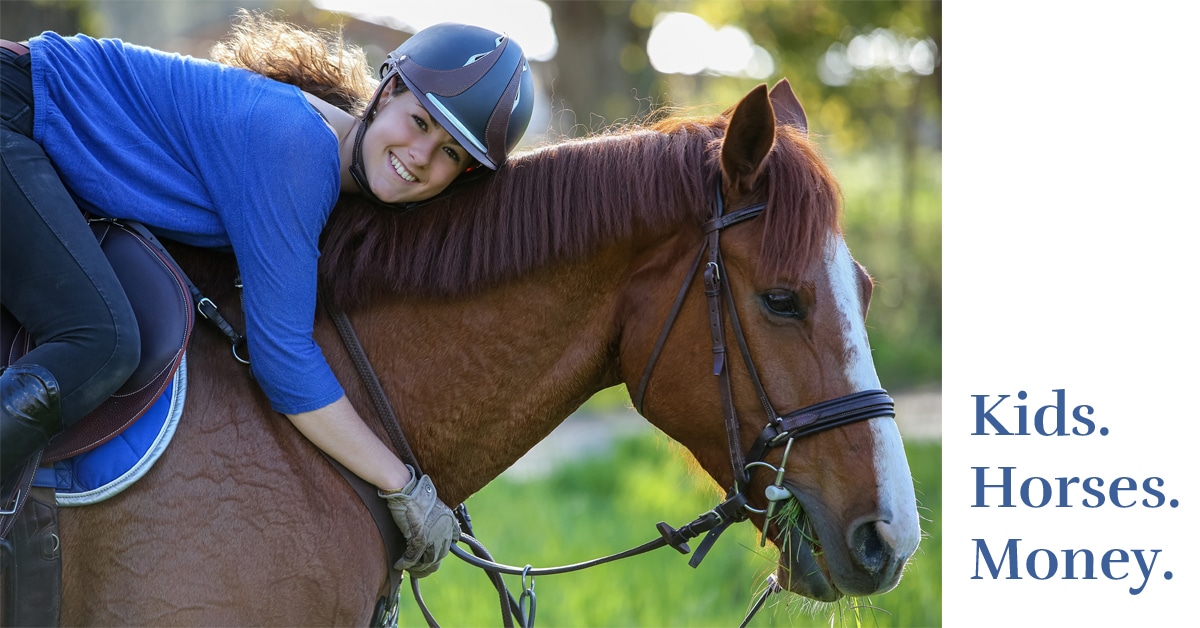Horses are an expensive hobby and create an excellent learning opportunity to turn young riders into fantastic money managers. Kids who have a good understanding of the costs associated with riding are more likely to be motivated to make the most of their horse time, to look for ways to reduce cost or earn money, and more deeply appreciate their riding opportunities.
How do you make the most of these opportunities so that money lessons are just another bonus combined with all the other amazing life lessons our youth get from horses? There are three places to get started:
Budgeting / Contracting / Planning
Budgeting
- Sit down with your child and discuss all the things that go into owning, leasing or being part of a lesson program. If this is new to you, also involve an experienced coach or another experienced horse family.
- Have your child list off all the things they need and want and fill in the missing items once your child can’t think of anything else.
- Once complete, assess not only the monthly cost but discuss what the total annual costs are.
- Consider setting up a separate account for horse expenses and involving your child in monitoring and reviewing the account.
- Set up an emergency fund for things such as veterinary care and contribute to it as a regular monthly bill.
- Tip: It is important to keep this non-emotional. Kids can feel shame about large amounts of money going to a goal just for them, especially if money is tight or there are other siblings who may not have as expensive of a hobby. Make space for and ask about how your child feels about this and use it as a discussion point. These conversations can form the basis of how your child approaches money in the future, making it positive and empowering.
Contracting
- Discuss the difference between needs and wants and see if there are opportunities to cut costs.
- Have your child come up with ways they will contribute, from sweeping the floor to cleaning paddocks and stalls to getting a part-time job when old enough. Ensure safety and liability concerns are considered if this work is around other horses.
- Decide on approaches for buying equipment used where possible and selling items they no longer use. Check with your child’s coach when making these decisions; often they have an equipment library and things like extra breeches. Safety equipment and tack keep your child safe; these are never the place to look to save costs.
- Agree on family and behavior non-negotiables that are expected, chores, behavior, grades.
- Talk about the seasonality of lessons and other expenses; could they take a lesson every two weeks in the off-season to be able to take more lessons closer to a competition? Will their horses go to pasture for a month or two a year?
- Riding lessons are expensive and valuable; talk to your child about being on time and prepared to make the most of their time with their coach.
- Understand the liability and risks of owning and being in control of a horse. Hold at a minimum Horse Council insurance and take the time to understand how it works, then have an age-appropriate discussion with your child on their responsibilities to keep themselves and others safe and reduce risks.
- Discuss breaking of the contract and consequences.
- Tip: Be clear about consequences for misbehaviour or non-participation in the contracting phase and be consistent in the application. Pulling riding privileges should never be a surprise. For most of us, riding and being near horses is a deeply emotional experience and while consequences for misbehavior are important, they should be established ahead of time and never inflicted out of anger or frustration.
Planning
- Help your child understand future goals and planning.
- Are there bigger and more expensive competitions in their future?
- Will they want to purchase a horse, or another horse?
- How will they manage their horse participation if school and work demands increase?
- What is their vision for university and young adulthood?
- What kinds of careers are best to support their goals of horse ownership?
- Tip: Now that you have opened the money dialogue, use it to transition to career planning. Take those annual expenses, add average living expenses and then look up the salary of some of the career choices available. Help your child think about short-term pain for long-term gain; get them dreaming into the future about what their life could look like even if that means taking a break from riding to focus on education. Many young riders have to give up the sport once they are young adults, having never understood the true cost and being unable to support it themselves.
Horses create a unique opportunity to connect with your child and leveraging their passion to have these kinds of conversations can create the basis for instilling excellent money habits and life skills. Creating these conversations early can help your child grow into an adult who has the skill set to budget, negotiate contracts, and create their desired future.
***
Colette Bruneau is a Certified Financial Planning professional and Consultant with IG Wealth Management with over 20 years’ experience helping people make the most of their money. She can be reached at Colette.Bruneau@ig.ca / 1-250-649-8063.

